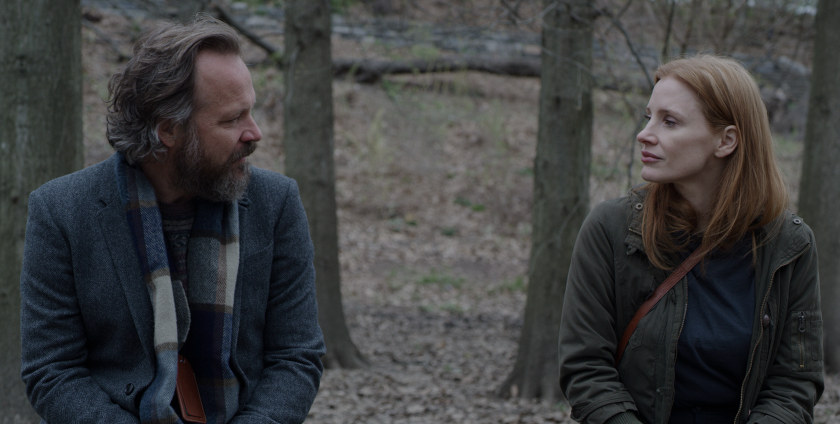Vassilis Kroustallis reviews the latest Michel Franco film 'Memory, with Jessica Chastin and Peter Sarsgaard.
Mexican filmmaker Michel Franco knows how to craft films that sound both distressing and terribly suspenseful and engaging (His 2012 breakthrough 'After Lucia' -Un Certain Regard award at Cannes is a prime example of this). Things are not different in his humane, still trauma-wrought but otherwise sunnier and breathier 'Memory', a story of love via the puzzling of memory fragments, back and forth - a film that deserves wide exposure.
Sylvia (Jessica Chastain) is an adult daycare social worker in Queens, New York. Her job keeps her busy, and so does her 13-year-old daughter Anna (a refreshing performance by Brooke Timberas); her AA meetings also keep her sober, and we learn (but only later in the film) that Sylvia has forgotten what it means to drink for exact 13 years -since her daughter was born. Sylvia is financially OK (having two jobs), but also nervous; purposedly single, and a rigid mum who won't trust any strangers around her daughter -save for her sister Olivia (Merritt Weveras) and her own family.
Enter Saul (Peter Sarsgaard), a middle-aged widower who crashes into Sylvia's reunion school party, and follows her afterward on the way home. Saul seems unable to cope (he sleeps the night on the street outside her apartment), and we soon learn he's in his early dementia stage. But, more intriguingly, he seems to know Sylvia from childhood -or (another interpretation) he is only confused.
Like both 'After Lucia' and the other sunny-infused film 'Sundown' (2021), screenwriter Franco knows how to place big narrative bombs in small dosages so that these pieces of info actually act as borders and bridges from one act to the next. This time, the first confrontation between Sylvia and Paul in the park (when they get to know who's who and who abused whom in the past) becomes the starting point of an on-off relationship between the two. Their haters-to-lovers rapport and vice versa is emotionally laden, but not outwardly expressed. Sylvia and Saul reveal characters already tested and tried by life. They only crave for a moment's communal peace -if only the past or their own perception of it would let them.
'Memory' proceeds like a narrative slow-burner; a thrilling number of revelations act as the fuse for further action and the fitting explanation for all the downbeat attitude characters have to wear. But the film won't isolate itself as a two-handed character study. Both Sylvia and Saul's desires and distress are mirrored in their extended family, which either is keen on helping but not able to (Sylvia's sister Olivia) or too distanced and estranged to do so (Sylvia's mother, in a maverick, icy performance by Jessica Harper).
Procul Harum's 'A Whiter Shade of Pale' song, with its sexual escapade innuendos, has a prominent role in a film where sex is much to be feared (and abuse looms large above the characters). 'What do you need a boyfriend?' is Sylvia's reply to her daughter when asked about dating, and her own single sex scene looks as pleasantly timid as ever. Saul, on the other hand, is a character who has more pressing, rational decision problems to solve, which makes his character a delightful absent-minded (but never eccentric) person on the verge of self-abandonment.
Franco sometimes pushes the characters too hard to stick together despite all odds; the prominent light in the film's mostly morning/early afternoon scenes only advances the belief that a sort of good ending is near. Even though the film tends at times to give the game away or some of his later revelations look legitimate but hastily dismissed, he still grabs the whole film together based on a newly gained humanism -despite all odds.
Jessica Chastain and Peter Sarsgaard (Volpi Cup for Best Actor at Venice Festival) complete each other in performances that prove equally fragile and powerfully stated. These suspend the 103-minute film -which, incidentally, doesn't miss a beat in its narrative development.
Visually designed and set in shots that favor both their characters and their lived surroundings (the film is about cohabitation, after all), 'Memory' goes for close-ups only a few times; most eloquently, in the film's starting scene of the AA meeting. The film undertakes a documentary look and a purpose to look for truth in the present -but has a lot of past 'truths' to reveal (not always in close-ups on the characters who might lie, purposedly or not).
'Memory' is a master case in compassion without advertising its aims -and the characters do the complete opposite in the process. It is direct, with characters that make things happen, and translates all its misery predicament into investigative questioning. To be watched with the alertness of vision and feeling.
Vassilis Kroustallis

